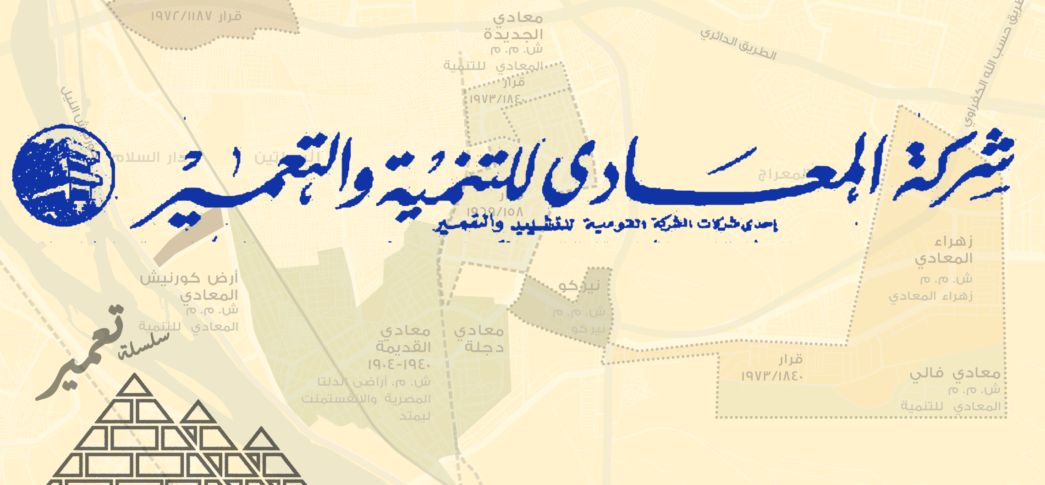
- Published on 06 June 2023
In our second Taamir article, we take a look at the history of the Maadi Company, a public real estate developer that was nationalised in the Socialist 60s, and is now one of four real estate SOE’s being (re)privatised in the 2023 Offering Program. Maadi is very significant because it was the fourth largest public real estate enterprise in our first Taamir article, and the second largest public company. As this chapter in its 120 year history is coming to a close, Maadi provides a rich case study on how public real estate developers expanded Cairo on public land allocated to them for free in the 60’s and 70s, and how they transformed under the neoliberal shift from the 1990s.
The Taamir [taʿ- mīr, urbanisation, تعمير] series aims to provide an insight into the impact of public investments in real estate in Egypt, on residents and the built environment. To read the rest of the series, click here.
| Name | Maadi Company for Development and Construction SAE |
| Website | maadicom.com Archived version |
| Annual Profits (Avg. 2015-2021)* | LE 277,582,166 |
| Paid in capital (2022) [1] | LE 750mn |
| Main activities | Master developer/real estate developer/ holding company |
| Ownership (2022) | 100% Government of Egypt – Holding Company for Construction and Development (HCCD) |
| Subsidiaries/affiliates (2022 Q4) | National Investment and Reconstruction Company (NIRCO) 50%
Alexandria for Investment and Urban Development Company 31% Tashyeed for Real Estate Development 25% Zahraa Maadi Investment and Development SAE (ZAMCO) 18.3% |
Establishment 1904 – 1961
In 1904, the London-based Egyptian Delta Light Railways Company Ltd. acquired a concession to build a new light railway line connecting Bab Al-Louq in downtown Cairo to the southern town of Helwan. It promptly established the Egyptian Delta Land and Investment Company Ltd. (EDLICO) to buy land on the railway line and build Maadi, a new suburb around halfway between Downtown Cairo and Helwan (Figure 2). Maadi started as a colonial development selling luxury villas to upper-middle-class Europeans and Egyptians, and was built on agricultural fields that surrounded the Maadi al-Khabiri village.[2] It was inspired by the English garden city model as a self-governed suburban community, distinguished by a linear urban grid with main diagonal avenues leading to green roundabouts.[3]
Figure 1: Timeline of key events of the Maadi Company 1904-2022
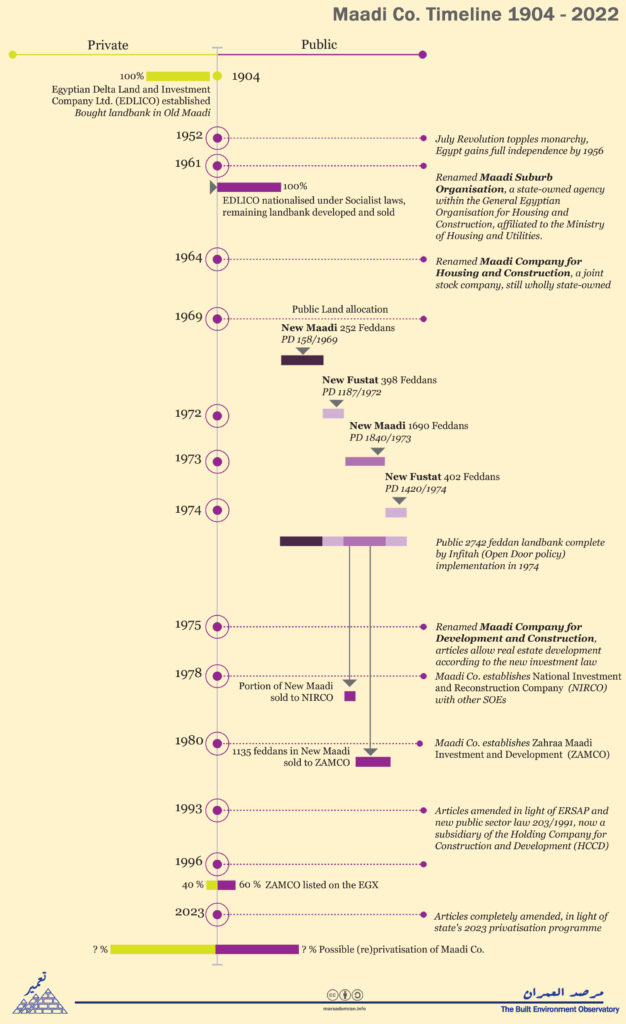
Nationalisation and expansion 1961 – 1991
EDLICO was nationalised by the socialist post-independence government of Gamal Abdel Nasser in 1961, as most large local and foreign-owned businesses were, and transformed into the wholly government state owned enterprise (SOE), the Maadi Suburb Organisation (Appendix 2, Figure 1). Over the next six decades it would develop extensions of Maadi to the north-west and west and other areas, changing names and government agencies along the way until it became the Maadi Company for Development and Construction, or Maadi Co., owned by the Holding Company for Construction and Development, or HCCD. Its clientele transformed from upper-class foreigners, to middle-class Egyptians, who bought apartments in low-rise buildings that the Maadi Company and its subsidiaries built.
These apartments were built on state-owned land that was allocated to the company for free or at nominal prices, to subdivide, provide with utility networks and roads (Figure 1, Appendix 1). Maadi extended northeast in 1969 into New Maadi, initially on 252 acres, then in 1974 a further 1690 acres were added north of New Maadi, as well as east of it into the desert. This land started to be developed years later, where Maadi Co. either sold plots to individuals, developers and cooperatives, though mostly built it through subsidiaries. To that end it established the National Investment and Reconstruction Company (NIRCO) with other SOEs in 1978 (Appendix 3), selling it a number of large subdivisions (shatr 2, 3, 5), that would be built in the 1980s and 90s and become colloquiallyy known as Nirco (Figure 2).[4] Another subsidiary, Zahraa Maadi Investment and Development (ZAMCO) was established with other HCCD companies in 1980 (Appendix 3). ZAMCO was to have more responsibilities than NIRCO, subdividing, selling, co-developing, and building 1135 acres in what would become Zahraa Al-Maadi City, east of the Autostrad highway (Figure 2).[5]
In addition to its Maadi concessions, Maadi Co. was given land in a then undeveloped area east of Old Cairo and the Fustat ruin fields. This land was envisioned to become the 800 acre New Fustat City. But Maadi Co. only developed 180 acres since then,[6] as it did not immediately endeavour to develop this concession. Instead, throughout the 1970s and 80s the self-built neighbourhoods of Izbit Khairallah and Batn al-Baqara emerged.[7] Maadi Co. lost claims to the Izbit Khairallah/ Istabl Anatar area in court cases in the 1990s, and residents have been allowed to formalise their ownership.[8] However, in 2021 Cairo Governorate evicted 1894 Batn al-Baqara families, relocating them to Cairo’s outskirts, and demolishing their homes, [9] leaving Maadi Co. free to redevelop the land.
Figure 2: Map of Maadi Company land concessions in Maadi and Old Cairo
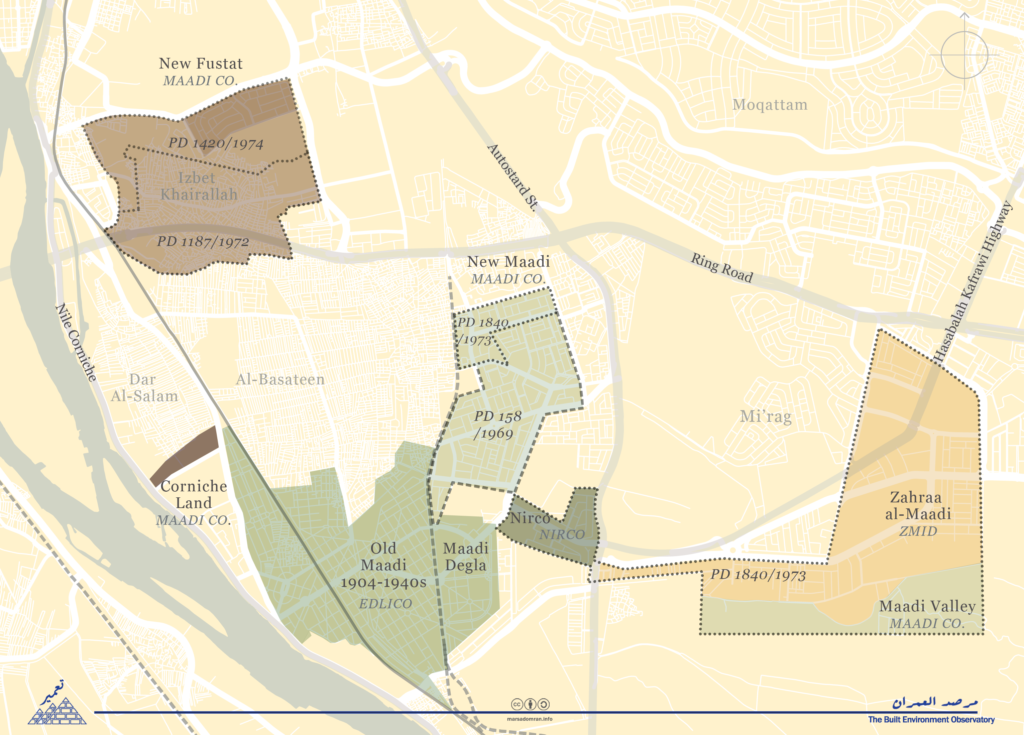
Neoliberal Transformation 1991 – 2023
In 1991, Egypt started applying the IMF and World Bank supported Economic Reform And Structural Adjustment Programme, or ERSAP.[10] The program entailed a complete independence of state-owned business from the Treasury (no state subsidies), which also meant that no free land allocations would be made to them by the state. ERSAP more famously set out the privatisation of a large portion of these public businesses, where the new Public Enterprise Law 2023/1991 curbed employee welfare, pushed companies to seek maximum profit as private business did, and restructured company ownership. Thus, the Maadi Company, along with a host of other real estate SOEs, moved from the Ministry of Housing, to the Ministry of Public Business Sector’s Holding Company for Construction and Development (HCCD). Over the latter half of the 1990s, HCCD listed a large number of the real estate companies it held, including Heliopolis Housing and Development HELI.CA, Madinet Nasr Housing and Development (Now Madinet Masr, MNHD.CA), and many others.
While Maadi Co. was not (re)privatised, two of its main subsidiaries were listed. The first was ZAMCO, listed on the Egyptian Stock Exchange (EGX) in 1996, where it remains a government-controlled company (Appendix 3). The second was NIRCO’s failed listing on the smaller Nile Exchange in 2011, until it was struck off in 2013 and remains majority government owned till today (Appendix 3).
Maadi Co. Today
Maadi Co. is part of a complex web of almost ten HCCD affiliated real estate developers (Figure 3). Along with Nasr Housing and Development, they remain the only two direct holdings where no private stake has been offered. Thus, it is no surprise that they have both been mentioned in the government’s recent privatisation plan.[11]
Figure 3: Maadi Company in the universe of HCCD real estate companies as of Q4 2022
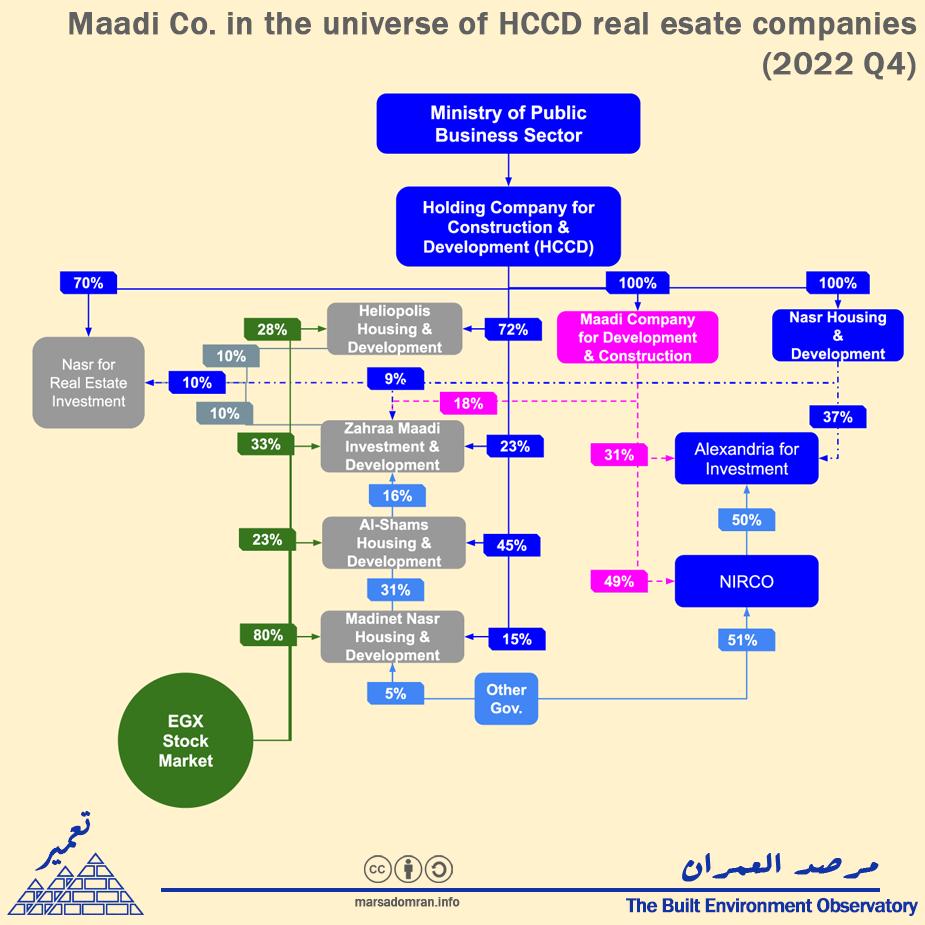
To that end, Maadi Co.’s articles of association were recently rewritten in 2022.[12] The new articles allow the Maadi Company to participate in all work related to real estate development projects, construction and real estate investment, as well as land planning, subdivision, project management and supervision. In particular, it can purchase, allot, sell, and dispose of any land and real estate needed for these projects. The company can also undertake the management of design projects as well as the supervision of the implementation of private and public real estate projects. It can also construct administrative buildings, schools, hotels, hospitals, and factories.
In terms of landbank, most of its New Maadi land has been developed, or sold to ZAMCO. The exceptions are the 138 acre Maadi Valley development south of Zahraa al-Maadi,[13] that is still under development. As well as a prominent 36 acre Nile front plot on the Maadi Corniche north of the Military Hospital, and east of the Supreme Constitutional Court,[14] that has remained undeveloped for years. Ownership of the latter plot was disputed in the early 2010s, where claimants built a number of apartment buildings.[15] These were spectacularly demolished by dynamite by the government in 2014,[16] after a string of complaints and calls for intervention by Maadi Co. (Figure 3). However, it is not clear whether the ownership dispute has been settled. In its other landbank, New Fustat, only 36 acres of the recently demolished neighbourhood of Batn al-Baqara are free to be redeveloped.
Figure 4: Maadi Co. advertisement calling on officials to protect its Maadi Corniche plot. Al-Ahram 16 February, 2014.
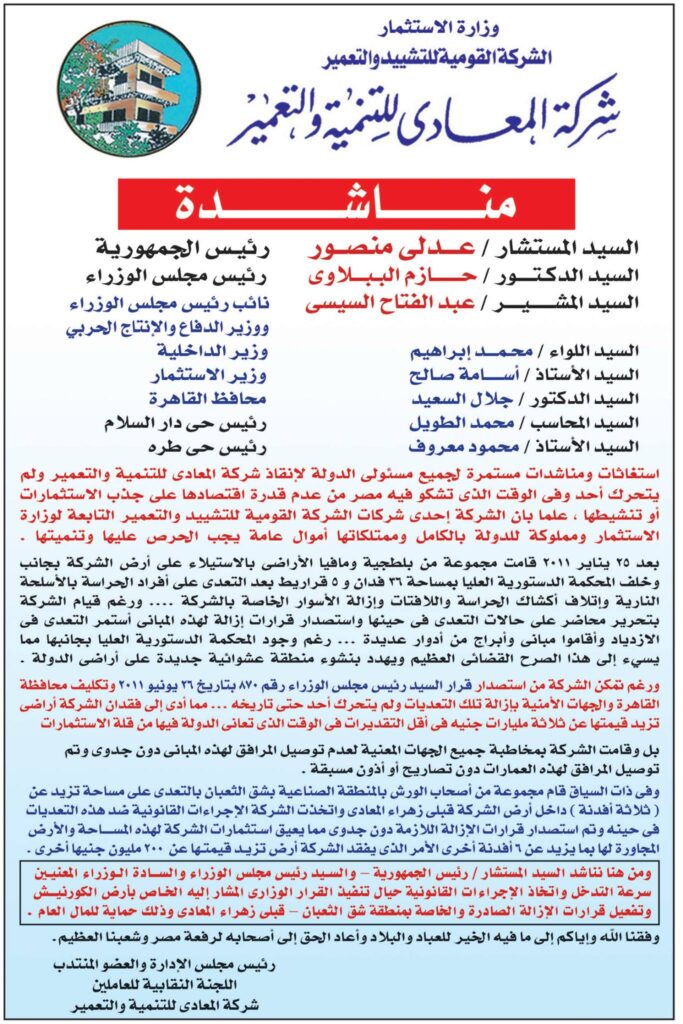
Maad Co. has investments in three subsidiaries (Appendix 3), though it has been selling its shares in its main subsidiary, ZAMCO, over the last few years, dropping from half to around 17% as of May 2023. It is not clear if it is a move that will see its complete exit of ZAMCO before it is offered for sale.
The Maadi Co. has been transformed beyond recognition since it was a British company that sought to build a quiet luxury suburb at the turn of the 20th Century. It has since expanded that suburb into a full Cairo neighbourhood that is home to one quarter of a million people, developing some land beyond Maadi. Over the course of almost 12 decades, we have seen how land moved between the private and public spheres, with much public land allocated to the company after its nationalisation. That land has ultimately rested in private hands as real estate is sold to private individuals – rather than rented, or leased. A significant portion of the public land allocated to Maadi Co, was also informally developed by low-income home-seekers exemplifying the failure of housing policy in the 1970s and 80s where the company, along with other state-owned real estate developers, almost exclusively sought middle-income clientele, and later, upper-income buyers, while they were given much more land than they had resources to develop. Today, Maadi Co.’s status is due to change yet again, where it will be partially or wholly (re)privatised, closing a successful, though controversial, chapter in Egypt’s public real estate development era.
Appendix 1: Public land allocations made to Maadi Co.
| Year | Development | Area (Acres) | Decree |
| 1969 – 88 | New Maadi
North extension North and east extension East ext. (East Degla), valued at LE 1.75/m2 Tenth sector (Low-income housing) Project: Zahraa al-Maadi (portion of 1840/1973) Project: Maadi Valley (portion of 1840/1973) |
252 1690 13 1.3 (1110) (138) |
CGD 432/2011 |
| 1972 – 74 | New Fustat | 398
402 |
PD 1187/1972 |
| PD: Presidential Decree, CGD: Cairo Governor Decree | |||
Appendix 2: : Timeline of Key Events
| Year | Event |
| 1904 | Established as the Egyptian Delta Land and Investment Company Ltd. (EDLICO) in the UK.[17] |
| 1961 | Nationalised and name changed to the Maadi Suburb Organisation (Mo’asasat Dahiyat al-Maadi), a state-owned agency within the General Egyptian Organisation for Housing and Construction, affiliated to the Ministry of Housing and Utilities.[18] |
| 1964 | Changed to the Maadi Company for Housing and Construction (Sharikat al-Maadi lil-iskan wal-ta’mir), an Arabian joint stock company, still wholly state-owned.[19] |
| 1975 | Changed to the Maadi Company for Development and Construction, articles allow real estate development according to the new investment law 43/1974 allowing foreign investments.[20] |
| 1993 | Articles amended in light of the new public sector law 203/1991,[21] and now a subsidiary of the Holding Company for Construction and Development (HCCD).[22] |
| 2022 | Articles completely amended,[23] in preparation to be listed on the Egyptian Exchange, or sold privately, as part of the state’s 2023 privatisation programme. |
Appendix 3: Subsidiaries and affiliates
| Name | National Investment and Reconstruction Company (NIRCO) | ||
| Website | nircoeg.com Archived version | ||
| Established | 1978[24] | ||
| Status | Listed on Nile Exchange (EGX Small companies) October 2011.[25]
Delisted January 2013.[26] |
||
| Paid in capital (2021) | LE 45 mn | ||
| Ownership | 1978 % | 2023 %[27] | |
| Maadi Company for Development and Construction (SOE) | 50.0 | 49.2 | |
| Misr Life Insurance (SOE) | 25.0 | 25.0 | |
| Banque Misr (SOE) | 25.0 | 25.0 | |
| Others (SOE) | 0.0 | 0.5 | |
| Individuals | 0.0 | 0.3 | |
| Total | 100.0 | 100.0 | |
| Name | Zahraa Maadi Investment and Development SAE[28] | ||
| Website | zahraa-maadi.com Archived version | ||
| Established | 1980 | ||
| Status | Listed on the EGX in July 1996, ticker ZMID.CA | ||
| Paid in capital (2021) | LE 264mn | ||
| Ownership | 1980 % | 2023 % | |
| Holding Company for Construction and Development (SOE) | 0.0 | 22.7 | |
| Arab Investment Bank (50% SOE in 2023) | 26.0 | 20.4 | |
| Maadi Company for Development and Construction (SOE) | 50.0 | 18.3 | |
| Nasr Housing and Development (SOE) | 8.0 | 9.3 | |
| Al-Maamoura Company for Construction and Touristic Development (SOE) | 8.0 | 6.3 | |
| Construction and Popular Housing Company (SOE) | 8.0 | 0.0 | |
| Target Real Estate Investment | 0.0 | 5.5 | |
| EGX Free float | 0.0 | 17.5 | |
| Total | 100.0 | 100.0 | |
| Total HCCD | 74.0 | 50.3 | |
| Total Government | 100.0 | 66.6 | |
| Name | Alexandria for Investment and Urban Development Company[29] | |
| Website | alex-inv.com Archived version | |
| Established | 2010 | |
| Status | Majority owned SOE | |
| Paid in capital (2021) | LE 1,065 mn | |
| Ownership | 2023 % | |
| Nasr Housing and Development (SOE) | 37.0 | |
| Maadi Company for Development and Construction (SOE) | 31.0 | |
| Metallurgical Industries Holding (SOE) | 24.2 | |
| Holding Company for Tourism, hotel (SOE) | 5.4 | |
| Piraeus Bank | 0.8 | |
| Arab Development and International Trade | 0.5 | |
| Petromin International | 0.5 | |
| Misr Life Insurance (SOE) | 0.3 | |
| Suez Canal Bank Employee Fund (SOE) | 0.2 | |
| International Marketmakers Combination | 0.1 | |
| Al-Maamoura Company for Construction and Touristic Development (SOE) | 0.1 | |
| Petromin International | 0.5 | |
| Total | 100.0 | |
| Total HCCD | 50.3 | |
| Total Government | 98.1 | |
| Name | Tashyeed for Real Estate Development[30] | |
| Website | NA | |
| Established | 2017 | |
| Status | SOE | |
| Paid in capital | NA | |
| Ownership[31] | 2017 % | |
| Egyptian contracting Company (Moukhtar Ibrahim) (SOE) | 50 | |
| Maadi Company for Development and Construction (SOE) | 25 | |
| Nasr Housing and Development (SOE) | 25 | |
| Total | 100.0 | |
| Total HCCD | 100 | |
| Total Government | 100 | |
Notes & References
[1] Minister of Public Business Sector Decree 17/2022.
[2] David Tresilian, “Maadi Memories,” Ahramonline, July 12, 2021.
[3] Sas Browne, “Remembering Maadi,” Egypt Today, January 1994.
[4] Maadi Company for Development and Construction, “Degla – al-Shatr al-Khamis,” maadicom.com, n.d., Archived on the Wayback Machine 05.10.2013.
[5] Zahraa Maadi Investment and Development “Annual Board of Directors Report 2021,” February 17, 2022.
[6] Maadi Company for Development and Construction, “Fustat City”. N.d. Archived: 01.04.2022.
[7] Tadamun, “`Izbit Khayrallah and the Struggle for Land: Security of Land Tenure,” tadamun.co, December 25, 2013.
[8] Ibid.
[9] ‘Cairo Governor Announces Completion of Batn Al-Baqara Informal Area Demolition’, Cairo Governorate, 23 June 2021, Archived on the Wayback Machine 29.05.2023.
[10] Amr Adly, ‘Short Term Fixes for Long Lasting Troubles: Why IMF Reforms Won’t Solve Egypt’s (Political) Economic Problems’ (Friedrich-Ebert-Stiftung, November 2018).
[11] ARE, The Cabinet, ‘Status of the Offering Program Companies – February 2023’ (ARE, The Cabinet, February 2023).
[12] Minister of Public Business Sector Decree 17/2022.
[13] Maadi Company for Development and Construction, “Maadi Valley”, n.d. Archived on the Wayback Machine 07.04.2022.
[14] Maadi Company for Development and Construction, “Maadi View – Corniche”, n.d. Archived on the Wayback Machine 12.03.2022.
[15] Doaa Al-fuli and Ishraq Ahmed, ‘Documents Reveal Details of Dispute over Constitutional Court Land (Arabic)’, Masrawy, 25 March 2014.
[16] Ali Abdel-Mohsen, ‘Maadi Demolition Campaign Turns Fatal’, Mada Masr, 8 April 2014, Archived on the Wayback Machine 24.12.2022.
[17] “Egyptian Delta Land and Investment Co Ltd v Todd (Inspector of Taxes)” (United Kingdom House of Lords, July 23, 1928). And: Robert Vitalis, “When Capitalists Collide: Business Conflict and the End of Empire in Egypt” (Berkeley: University of California Press, 1995). p35.
[19] “Presidential Decree 2906/ 1964”.
[20] “Minister of Housing and Reconstruction Decree 50/1975”.
[21] Maadi Company for Construction and Development, “AGM Decision on December 29, 1992”.
[22] “Prime Ministerial Decree 217/1993, Merging Some Public Sector Holding Companies and Reassigning Subsidiaries ”. In: “Minister of Public Business Sector Decree 522/1995, Approving HCCD Articles of Association.”
[23] “Minister of Public Business Sector Decree 17/2022.”
[24] “Minister of the Economy Decree 170/1978, Articles of Association”, and: Ministry of Public Business Sector, “National Investment and Reconstruction Company (NIRCO),” mpbs.gov.eg. n.d. Archived on the Wayback Machine: June 5, 2023.
[25] The Egyptian Exchange, “Listing National Investment and Reconstruction Company on the Egyptian Exchange,” egx.com, October 16, 2011. Archived on the Wayback Machine 16.03.2023.
[26] The Egyptian Exchange, “Delisting National Investment and Reconstruction Company from the Egyptian Exchange,” eg-brok.com, January 20, 2013. Archived on the Wayback Machine: June 5, 2023.
[27] Ministry of Public Business Sector, “National Investment and Reconstruction Company (NIRCO),” mpbs.gov.eg. n.d. Archived on the Wayback Machine: June 5, 2023.
[28] “Minister of the Economy Decree 53/1980”, and: Zahraa Maadi Investment and Development, “About Us,” zahraa-maadi.com, 2020, Archived on the Wayback Machine 02.05.2015.
[29] Ministry of Public Business Sector, “Alexandria for Investment and Urban Development,” mpbs.gov.eg, n.d.. Archived on the Wayback Machine: June 5, 2023.
[30] Salem, Abdelhalim. “Holding Company for Construction Finishes Establishment of Tashyeed for Real Estate Development from a Consortium of Four Companies”(Arabic), al-Youm al-Sabe’. August 15, 2017. Archived on the Wayback Machine: June 5, 2023.
[31] There is no mention of the company in Heliopolis for Housing and Development disclosures, thus it was omitted from the list.
